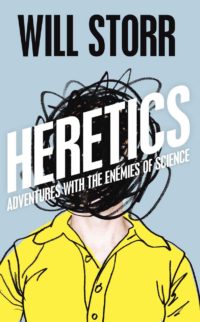RESEARCH: 4/5
WRITING STYLE: 4/5
ENTERTAINMENT QUOTIENT: 4/5
The world is never short of alternate sciences or theories or remedies or any other thing.
If there is a correct way to do a thing, many alternate ways, some good and some farce, always find a way into existence. Allopathy, homoeopathy, naturopathy, acupuncture, etc.
Psychotherapy has past life regression, meditation, yoga, music therapy, etc. And any person who believes in these alternate methods – methods which are at odds with what is generally accepted – are called “Heretics”.
Though many of these alternate methods do not have a scientific backup, millions of people believe in them. But why? Are they mad? Is their brain messed up?
This is what Will Storr tries to answer in his book The Heretics: Adventures with the Enemies of Science. And most of the inferences drawn by him are through interviews with both, heretics, and sceptics.
The idea to research about heretics germinated when Will Storr met John Mackay, a celebrity creationist. Mackay, a geologist and geneticist, sincerely believed that the human race propagated through Adam and Eve, in spite of the contradicting evidence.
After this chance meeting, Storr concluded that heretics were not crazy and mad, and decided to unravel the reasons behind the origin of such extravagant beliefs.
He met believers and practitioners of homoeopathy. He met people who claimed to have seen UFOs and been abducted by aliens. He met past life regression therapists and specialists in lucid dreaming. He attended Baba Ramdev’s pranayama camp and a Buddhist meditation camp.
He met schizophrenics and Morgellons sufferers. He even interviewed countless sceptics like “The Skeptics Group”, doctors of conventional medicine, psychiatrists, scientists, neurosurgeons etc.
Storr’s study into the various aspects of the brain leading to such unconventional beliefs is very detailed and convincing. Loads of information about past studies, trials and assessments are added at appropriate places.
The book ends with Storr’s meeting with the greatest heretic – David Irving, a staunch believer in Hitler’s innocence, and the greatest sceptic – James Randi, of the “James Randi Foundation”.
[perfectpullquote align=”full” cite=”” link=”” color=”” class=”” size=””]“When the Skeptics talk about homoeopathy, they say, ‘There is no evidence.’ When the medical establishment talks about Swami Ramdev’s pranayama, they say, ‘It doesn’t work’; when they judge Morgellons sufferers, they say, ‘They are delusional.’ But what if pranayama works like homoeopathy works, by brilliantly triggering various powerful placebo effects?”[/perfectpullquote]
Storr’s simplistic and easy writing style helps a reader to focus more on the content of the book rather than getting lost in a flowery language.
The research style too is interesting, and follows a crude Delphi technique; a point of view of one group is discussed with the opposing group generating a totally diverging opinion, which is again discussed with the first group, and vice versa.
The readers become the jury in this grand trial of heretics and sceptics and are allowed to draw their own judgements.
The Heretics: Adventures with the Enemies of Science puts forth some interesting evidence about the makeup of our brain and forces us to think unconventionally, to become heretics for a while, and think the way they do.
So are heretics mad? Are their brains twisted? Is there a common problem across all heretics?
Do read The Heretics to get the answers to these interesting and transforming questions.
Please let us know if you liked the review in the comments below.
